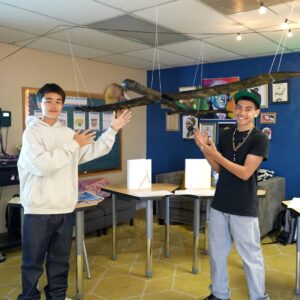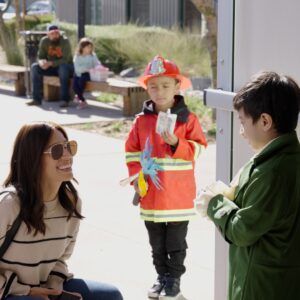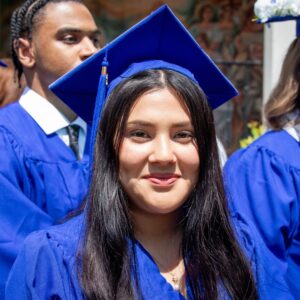At iLEAD Hybrid, we’re dedicated to cultivating lifelong learners, empathetic citizens, authentic individuals, and design thinkers. We achieve these Learner Outcomes through our unique methodology, built on three pillars: project-based learning (PBL), social-emotional learning (SEL), and individualized learning. Together, these pillars create a dynamic and supportive environment where every learner can succeed and discover their unique path.
Project-Based Learning (PBL)
 Project-Based Learning (PBL) is a powerful teaching methodology that places learners at the center of their education. It challenges them to deeply investigate personally interesting and complex questions, problems, or challenges. Through this deep investigation, learners then create and publicly present something original and authentic in response. This process goes beyond simply memorizing facts; it encourages learners to develop deeper understanding, critical thinking skills, and the ability to apply their knowledge in real-world contexts.
Project-Based Learning (PBL) is a powerful teaching methodology that places learners at the center of their education. It challenges them to deeply investigate personally interesting and complex questions, problems, or challenges. Through this deep investigation, learners then create and publicly present something original and authentic in response. This process goes beyond simply memorizing facts; it encourages learners to develop deeper understanding, critical thinking skills, and the ability to apply their knowledge in real-world contexts.
What PBL Encompasses at iLEAD Hybrid:
- School Culture of PBL: Our entire school environment is designed to foster inquiry, collaboration, and real-world problem-solving. From operations and facilities to academics and community connections, everything is learner-centered. We prioritize academic exploration and critical thinking, ensuring PBL is an authentic and meaningful experience throughout the school.
- Project-Based Teaching Practices: Our facilitators are equipped with the tools and strategies to implement effective PBL:
- Design and Plan: Facilitators design and adapt projects to fit their unique context and learners, planning from launch to culmination while allowing for learners to have voice and choice. Our unique design guide ensures projects are of the highest quality.
- Align to the Standards: Projects are carefully planned to address key knowledge and understanding from relevant subject areas, ensuring rigorous learning that aligns with state standards. Pacing guides, curriculum, and high expectations are all geared toward this alignment.
- Build the Culture: Facilitators actively promote learner independence, growth, open-ended inquiry, teamwork, and a commitment to quality in all aspects of the project.
- Manage Activities: Facilitators collaborate with learners to organize tasks, set schedules, establish checkpoints and deadlines, find and use resources, create products, and facilitate their public presentation.
- Scaffold and Differentiate Learning: A variety of lessons, tools, and instructional strategies are employed to support all learners in achieving project goals. We provide targeted differentiation for English Learners, learners with disabilities, and learners requiring Tier II and III interventions.
- Assessing Learning: Facilitators use a combination of formative and summative assessments to evaluate knowledge, understanding, and success skills. This includes self and peer assessment of work both by individuals and teams. Our philosophy of “beautiful work” in project-based learning emphasizes creating high-quality, meaningful, and visually appealing products, encouraging pride and excellence in every student’s output.
- Engage and Coach: Facilitators learn and create alongside learners, providing skill-building, redirection, encouragement, and celebration as needed to support their growth.
Social-Emotional Learning (SEL)
 It takes more than academic knowledge to become an effective leader in today’s world. Social-Emotional Learning (SEL) teaches learners essential skills to manage their emotions, resolve conflict, and make responsible and well-thought-out decisions. In our increasingly digital world, these vital skills are more crucial than ever. By integrating SEL, we ensure our learners are truly prepared for success in college, career, and civic life.
It takes more than academic knowledge to become an effective leader in today’s world. Social-Emotional Learning (SEL) teaches learners essential skills to manage their emotions, resolve conflict, and make responsible and well-thought-out decisions. In our increasingly digital world, these vital skills are more crucial than ever. By integrating SEL, we ensure our learners are truly prepared for success in college, career, and civic life.
Implementation and assessment of social-emotional learning are integral to our teaching and learning approaches through project-based learning. We draw upon practices like Stephen and Sean Covey’s 7 Habits of Highly Effective People/Kids/Teens® to measure and report social-emotional learning progress as part of every project, Individualized Learning Plan (ILP) goals, and Reports of Progress.
The 7 Habits of Highly Effective People:
Stephen Covey’s influential book has significantly shaped iLEAD Hybrid’s approach to lifelong learning. We encourage the regular practice of these habits to foster positive interactions with oneself and others:
- Be Proactive: Take responsibility for your actions and focus on what you can control, rather than reacting to external circumstances.
- Begin With the End in Mind: Start each day, task, or project with a clear vision of your desired direction and destination, then work proactively to achieve it.
- Put First Things First: Prioritize your purpose, values, roles, and tasks to effectively manage your life.
- Think Win-Win: Seek mutually beneficial solutions in all interactions, where agreements and outcomes are satisfying for everyone involved.
- Seek First to Understand, Then Be Understood: Actively listen to understand another’s perspective before attempting to express your own, moving beyond your own frame of reference.
- Synergize: Promote cooperation, teamwork, and open-mindedness, embracing the idea that collective effort yields greater results than individual contributions.
- Sharpen the Saw: Engage in balanced self-renewal across four key areas of life: physical, social/emotional, mental, and spiritual, to maintain well-being and effectiveness.
Individualized Learning
 The primary goal of individualized learning at iLEAD Hybrid is to ensure that each learner is treated as an individual, working toward attainable goals appropriate to their unique development.
The primary goal of individualized learning at iLEAD Hybrid is to ensure that each learner is treated as an individual, working toward attainable goals appropriate to their unique development.
Individualized learning is an educational approach that tailors instruction to the unique needs, abilities, and interests of each learner. Recognizing that individuals have distinct learning styles, paces, and preferences, we create a personalized learning experience to optimize educational outcomes. Through a wide variety of technology, materials, activities, and assessments, individualized learning provides customized content, pace, and feedback, allowing learners to progress at their own speed, explore areas of interest, and receive targeted support. This learner-centered approach fosters autonomy, engagement, and mastery by acknowledging and addressing the diverse learning needs of every learner.
To achieve this, at the start of each school year, every learner, in collaboration with their facilitator and parents/guardians, creates an Individualized Learning Plan (ILP). This plan includes specific academic goals (aligned to Common Core State Standards) and social-emotional goals. These goals are integrated into projects throughout the year, continuously monitored, assessed, and reflected upon by both the learner and their facilitator. This process powerfully motivates learners to develop their skills, supported by clear expectations, public displays of meaningful work, and opportunities to showcase talents in modalities that best suit their distinct learning styles.
Key Components of Individualized Learning:
- Individualized Learning Plans (ILPs): Alongside facilitators and families, learners create and implement ILPs at the beginning of the school year.
- Learner-Led Conferences: These conferences are a crucial way to engage children in understanding and taking ownership of their learning. We believe this structure strengthens communication and relationships with all families.
- Learning Showcases: A fantastic opportunity to share and celebrate learner achievements throughout the school year. Showcases allow each learner to demonstrate their growth and the skills they have acquired, aligning with the iLEAD Learner Outcomes.
- Portfolio/Leadership Notebook: Leadership Notebooks/Portfolios document a learner’s academic and social-emotional growth and are used during Learner-Led Conferences and throughout the year.
